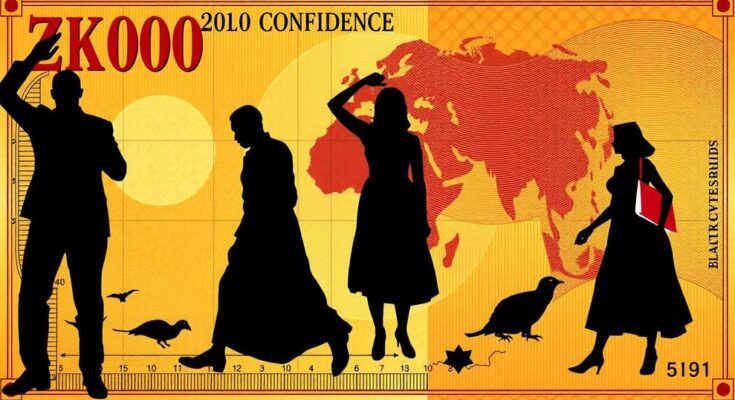Zimbabwe is experiencing a crisis of confidence in its gold-backed currency (ZiG), leading to a surge in illegal money changers offering higher exchange rates for dollars. In August, inflation for the ZiG rose to 1.4% as it lost value against the dollar. Despite government efforts to regulate currency exchanges and stabilize the ZiG, illegal markets thrive due to distrust, with many preferring the US dollar for transactions. Economists warn that low gold reserves and inflationary pressures could destabilize the economy further, necessitating a renewed focus on public trust and economic policies.
Zimbabwe is currently facing a significant crisis of confidence concerning its newly introduced gold-backed currency, known as the ZiG (Zimbabwe Gold). Compounding this issue, individuals are increasingly turning to illegal currency exchange operators as they encounter difficulties in obtaining the ZiG at viable rates. Consequently, these illegal money changers, often operating in urban centers such as Harare and Bulawayo, offer substantially higher exchange rates for foreign currency, thereby exacerbating inflation and casting further doubt on the viability of the ZiG. In Harare, illegal forex traders have become a common sight, particularly near key locations like the Harare City Council and Zimbabwe Electricity Supply Authority offices. In Bulawayo, similar activities are observed, with traders utilizing platforms such as WhatsApp to reach clientele, demonstrating the lengths to which individuals will go in order to secure foreign currency amid stringent official regulations and limited access to formal channels. Statistical indicators reveal that the ZiG has faced growing inflation, with a rise to 1.4% in August, marking a sharp contrast to the minimal decline noted in July. Furthermore, the official trading value of the ZiG has depreciated against the US dollar, revealing mounting pressure as individuals unofficially transact at rates as high as ZiG26 to the dollar. Despite efforts by authorities to regulate illegal forex activities with fines and arrests, the black market continues to thrive, reflecting ongoing distrust in the local currency. The continued dominance of the US dollar in transactions highlights a lack of faith in the formal financial system, as pointed out by Chenayi Mutambasere, a development economist. She articulates that the disparity between the official and parallel market exchange rates originates from a pronounced lack of trust among businesses and consumers. This, in turn, leads to a diminished demand for the ZiG, consequently weakening its value further. Competitively, rising prices of essential commodities, such as food and household items, are evident in the local market due to supply chain strains intensified by factors like unreliable electricity and water access. Moreover, the low gold reserves backing the ZiG have prompted warnings from economists about the potential for a destabilizing effect on the economy, necessitating a more robust reserve base to support the currency. The Reserve Bank of Zimbabwe (RBZ) is currently attempting to stabilize the ZiG through a renewed ‘Back-to-Basics’ monetary policy approach, aimed at maintaining price stability while ensuring that the currency is backed by tangible reserves. Recent actions, including the injection of substantial sums into the interbank market, aim to alleviate immediate pressures on the currency. However, the realignment of the ZiG’s value with market perceptions and confidence remains critical, as noted by local economists.
The situation surrounding Zimbabwe’s gold-backed currency, the ZiG, reflects deeper issues associated with economic management and public trust within the monetary system. Following years of hyperinflation and economic turmoil, the introduction of a gold-backed currency was intended to restore confidence and stabilize the economy. However, the challenges faced in accessing the currency, alongside the rise of illegal exchanges, indicate a critical lack of faith in not only the currency itself but also in the broader financial infrastructure. Analysts are concerned that inflationary pressures and reliance on the US dollar for everyday transactions undermine efforts to revitalize the local economy, warranting a comprehensive approach to restoring confidence in the ZiG and the financial system.
The ongoing crisis surrounding the Zimbabwe Gold currency underscores significant economic challenges, including inflation, reliance on informal currency exchanges, and a lack of public trust in the local financial system. Despite governmental interventions aimed at stabilizing the ZiG, the effectiveness of these measures remains questionable, as prevailing market perceptions are heavily influenced by confidence in the local economy and broader socio-economic conditions. For Zimbabwe to regain stability, a multifaceted approach addressing the root causes of public distrust and economic insecurity is essential.
Original Source: www.theafricareport.com




